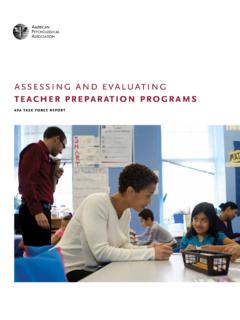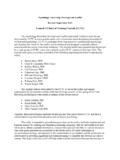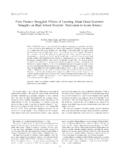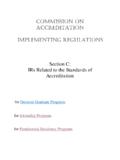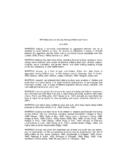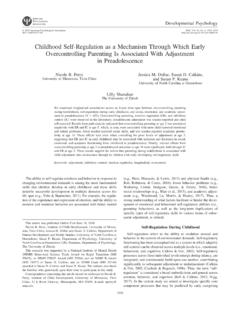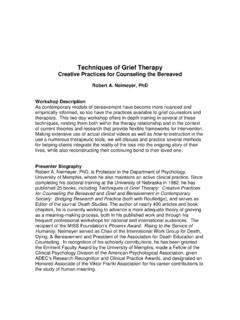Transcription of Guidelines for Psychological Practice With Older Adults
1 Guidelines for Psychological Practice WithOlder AdultsAmerican Psychological AssociationThe Guidelines for Psychological Practice WithOlder Adults are intended to assist psychologists inevaluating their own readiness for working witholder Adults and in seeking and using appropriate educationand training to increase their knowledge, skills, and expe-rience relevant to this area of adultstypi-cally refers to persons 65 years of age and Older and iswidely used by gerontological researchers and policymak-ers. We useolder adultsin this document since it iscommonly used by geropsychologists and is the recom-mended term in American Psychological Association(APA) publications (APA, 2010b). The specific goals ofthese professional Practice Guidelines are to provide prac-titioners with (a) a frame of reference for engaging inclinical work with Older Adults and (b) basic informationand further references in the areas of attitudes, generalaspects of aging, clinical issues, assessment, intervention,consultation, professional issues, and continuing educationand training relative to work with this group.
2 The guide-lines recognize and appreciate that there are numerousmethods and pathways whereby psychologists may gainexpertise and/or seek training in working with Older document is designed to offer recommendations onthose areas of awareness, knowledge, and clinical skillsconsidered as applicable to this work, rather than prescrib-ing specific training methods to be followed. The guide-lines also recognize that some psychologists will specializein the provision of services to Older Adults and may there-fore seek more extensive training consistent with practicingwithin the formally recognized specialty of ProfessionalGeropsychology (APA, 2010c).These professional Practice Guidelines are an updateof the Guidelines for Psychological Practice With OlderAdults originally developed by the Division 12, Section II(Society of Clinical Geropsychology) and Division 20(Adult Development and Aging) Interdivisional Task Forceon Practice in Clinical Geropsychology and approved asAPA policy by the Council of Representatives in August2003.
3 The termguidelinesrefers to pronouncements, state-ments, or declarations that suggest or recommend specificprofessional behavior, endeavors, or conduct for psychol-ogists. Guidelines differ from standards in that standardsare mandatory and may be accompanied by an enforcementmechanism. Thus, Guidelines are aspirational in are intended to facilitate the continued systematicdevelopment of the profession and to help ensure a highlevel of professional Practice by psychologists. These pro-fessional Practice Guidelines are not intended to be manda-tory or exhaustive and may not be applicable to everyclinical should not be construed as definitive and arenot intended to take precedence over the judgment ofpsychologists. Professional Practice Guidelines essen-tially involve recommendations to professionals regard-ing their conduct and the issues to be considered inparticular areas of Psychological Practice .
4 Professionalpractice Guidelines are consistent with current APA pol-icy. It is also important to note that professional practiceguidelines are superseded by federal and state law andmust be consistent with the current APA Ethical Prin-ciples of Psychologists and Code of Conduct (APA,2002a,2010a). These Guidelines were developed for usein the United States but may be appropriate for adapta-tion in other for the GuidelinesA revision of the Guidelines is warranted at this time aspsychological science and Practice in the area of psychol-ogy and aging have evolved rapidly. Clinicians and re-searchers have made impressive strides toward identifyingThis revision of the 2003 Guidelines for Psychological Practice WithOlder Adults was completed by the Guidelines for Psychological Prac-tice With Older Adults Revision Working Group and approved as APApolicy by the APA Council of Representatives in August 2013.
5 Membersof the Guidelines for Psychological Practice With Older Adults RevisionWorking Group were Gregory A. Hinrichsen (chair), Icahn School ofMedicine at Mount Sinai; Adam M. Brickman, Columbia University;Barry Edelstein, west virginia University; Tammi Vacha-Haase, Colo-rado State University; Kimberly Hiroto, Puget Sound Health Care System, department of Veterans Affairs; and Richard Zweig, Yeshiva Guidelines Revision Working Group is thankful to the APAC ommittee on Aging for convening the group and to Division 20 (AdultDevelopment and Aging) and Division 12 Section II (Society of ClinicalGeropsychology) and the APA Council of Representatives for providingfinancial support for the revision. APA Office on Aging Director DeborahDiGilio and Administrative Coordinator Martha Randolph provided out-standing administrative literature cited herein does not reflect a systematic meta-analysisor review of the literature but rather was selected by the working group toemphasize clinical best practices.
6 Care was taken to avoid endorsingspecific products, tools, or proprietary Guidelines are scheduled to expire as APA policy in February2023. After this date, users are encouraged to contact the Office on Aging,APA Public Interest Directorate to determine whether this documentremains in concerning these Guidelines should be addressed tothe Office on Aging, Public Interest Directorate, American PsychologicalAssociation, 750 First Street, NE, Washington, DC document is copyrighted by the American Psychological Association or one of its allied article is intended solely for the personal use of the individual user and is not to be disseminated 2014 American Psychologist 2014 American Psychological Association 0003-066X/14/$ 69, No. 1, 34 65 unique aspects of knowledge that facilitate the accuratepsychological assessment and effective treatment of olderadults as the Psychological literature in this area has noted in the previous Guidelines for Psycho-logical Practice With Older Adults (APA, 2004), pro-fessional psychology Practice with Older Adults has beenincreasing, due both to the changing demography of thepopulation and to changes in service settings and marketforces.
7 The inclusion of psychologists in Medicare in1989 markedly expanded reimbursement options forpsychological services to Older Adults . Today, psychol-ogists provide care to Older Adults in a wide range ofsettings, from home and community-based settings tolong-term care settings. Nonetheless, Older Adults withmental disorders are less likely than younger and mid-dle-aged Adults to receive mental health services and,when they do, are less likely to receive care from amental health specialist (Bogner, de Vries, Maulik, &Un tzer, 2009; Institute of Medicine, 2012; Karlin,Duffy, & Gleavs, 2008; Klap, Unroe, & Un tzer, 2003;Wang et al., 2005).Unquestionably, the demand for psychologists with asubstantial understanding of later-life wellness, cultural,and clinical issues will expand in future years as the olderpopulation grows and becomes more diverse and as cohortsof middle-aged and younger individuals who are receptiveto Psychological services move into old age (Karel, Gatz, &Smyer, 2012).
8 However, psychologist time devoted to careof Older Adults does not and likely will not meet theanticipated need (Karel, Gatz, & Smyer, 2012;Qualls,Segal, Norman, Niederehe, & Gallagher-Thompson, 2002).Indeed, across professions, the geriatric mental health careworkforce is not adequately trained to meet the health andmental health needs of the aging population (Institute ofMedicine, 2012). Older Adults are served by psychologists acrosssubfields including clinical, counseling, family, geropsy-chology, health, industrial/organizational, neuropsychol-ogy, rehabilitation, and others. The 2008 APA Survey ofPsychology Health Service Providers found that ofrespondents viewed Older Adults as their primary focusand 39% reported that they provided some type of psy-chological services to Older Adults (APA, Center forWorkforce Studies, 2008).
9 Relatively few psychologists,however, have received formal training in the psychol-ogy of aging. Fewer than one third of APA-memberpracticing psychologists who conducted some clinicalwork with Older Adults reported having had any graduatecoursework in geropsychology, and fewer than one infour received any supervised practicum or internshipexperience with Older Adults (Qualls et al., 2002). Manypsychologists may be reluctant to work with Older adultsbecause they feel they do not possess the requisiteknowledge and skills. In the practitioner survey con-ducted by Qualls et al., a high proportion of the respon-dents (58%) reported that they needed further training inprofessional work with Older Adults , and 70% said thatthey were interested in attending specialized educationprograms in clinical geropsychology.
10 In two small sur-veys of psychology students, over half of those surveyeddesired further education and training in this area, and90% expressed interest in providing clinical services toolder Adults (Hinrichsen, 2000; Zweig, Siegel, & Snyder,2006).CompatibilityThese Guidelines build upon APA s Ethics Code (APA,2002a,2010a) and are consistent with the Criteria forPractice Guideline Development and Evaluation (APA,2002b) and preexisting APA policies related to aging is-sues. These policies include but are not limited to the Resolution on Ageism (APA, 2002d), theBlueprint forChange: Achieving Integrated Health Care for an AgingPopulation(APA, Presidential Task Force on IntegratedHealth Care for an Aging Population, 2008), the Resolu-tion on Family Caregivers (APA, 2011), and the Guide-lines for the Evaluation of Dementia and Age-RelatedCognitive Change (APA, 2012b).

